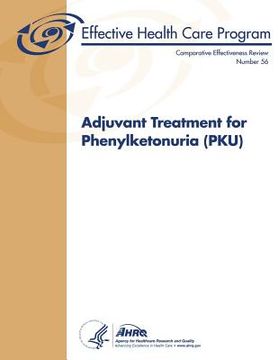Adjuvant Treatment for Phenylketonuria (PKU): Comparative Effectiveness Review Number 56 (en Inglés)
Reseña del libro "Adjuvant Treatment for Phenylketonuria (PKU): Comparative Effectiveness Review Number 56 (en Inglés)"
Phenylketonuria (PKU) is a metabolic disorder in which an inability to properly metabolize the amino acid phenylalanine (Phe) leads to a buildup of Phe in the blood and subsequent neurotoxicity that can cause intellectual disability, delayed speech, seizures, behavior abnormalities, and other medical and mental health problems if untreated. PKU is typically diagnosed soon after birth using biochemical tests that are performed after an abnormal newborn screening result. The most severe form of PKU, classic PKU, is typically characterized by blood Phe levels exceeding 1200 μmol/L while on a normal diet. With adherence to a Phe-restricted diet, poor outcomes can be mitigated. Nonetheless, management of PKU can be difficult and onerous for the patient and the family, leading to interest in identifying new ways of managing this lifelong condition. Further, questions remain as to the empirical basis for the selection of specific blood Phe levels as targets of good dietary control. High blood levels of Phe in untreated PKU can result in multiple medical problems, including intellectual disability, delayed speech, seizures, and behavior abnormalities. Individuals with PKU are also susceptible to other adverse outcomes, including impaired executive function, reduced processing speed, attention problems, impaired fine motor skills, and mental health concerns (such as anxiety and depression symptoms). The overall goal of this CER is to inform clinician and patient decisions about adjuvant treatments for PKU in addition to dietary restriction. This CER summarizes evidence for the effectiveness of BH4 in individuals with PKU, including pregnant women. The review also summarizes the evidence for the effectiveness of LNAAs, including pregnant women, with PKU. This review also seeks to examine the evidence for specific blood Phe levels to minimize cognitive impairment in individuals with PKU and whether specific levels may be applicable to specific age groups. We have synthesized evidence in the published literature to address these Key Questions including: KQ 1a. What is the evidence that any specific Phe levels are optimal for minimizing or avoiding cognitive impairment in individuals with PKU? KQ 1b. What is the evidence that different target Phe levels are appropriate for minimizing or avoiding cognitive impairment for different age groups? KQ 2. What is the comparative effectiveness of BH4 with dietary intervention versus dietary intervention alone for affecting outcomes including measures of cognition (including executive function), quality of life, and nutritional status? Subgroups include the following: Infants with PKU, Children ages 2 to 12 years old with PKU, Adolescents ages 13 to 21 years old with PKU, Adults greater than 21 years old with PKU. KQ 3. What is the comparative effectiveness of BH4 with dietary intervention versus dietary intervention alone in pregnant women with PKU for affecting outcomes in their infants, including prevention of neurological impairment, microcephaly, and cardiac defects? KQ 4. What is the comparative effectiveness of LNAAs with dietary intervention versus dietary intervention alone for affecting outcomes including measures of cognition, quality of life, and nutritional status? Subgroups include the following: Infants with PKU, Children ages 2 to 12 years old with PKU, Adolescents ages 13 to 21 years old with PKU, Adults greater than 21 years old with PKU. KQ 5. What is the comparative effectiveness of LNAAs with dietary intervention versus dietary intervention alone in pregnant women with PKU for affecting outcomes in their infants, including prevention of neurological impairment, microcephaly, and cardiac defects? KQ 6. What are the harms, including adverse events, associated with the use of BH4 or LNAAs in individuals with PKU? KQ 7. What is the evidence for the effectiveness of the addition of BH4 or LNAAs to dietary intervention for affecting outcomes in subgroups of patients?

